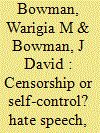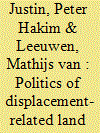|
|
|
Sort Order |
|
|
|
Items / Page
|
|
|
|
|
|
|
| Srl | Item |
| 1 |
ID:
147078


|
|
|
|
|
| Summary/Abstract |
In 2013, the Kenyan government adopted a hybrid censorship strategy that relied on regulation, the presence of a strong security state, and the willingness of Kenyans to self-censor. The goal of this censorship strategy was to ensure a peaceful election. This study examines two issues. First, it investigates steps taken by the Kenyan government to minimise hate speech. Second, it explores how efforts to minimise hate speech affected citizen communications over SMS during the 2013 election. An initial round of qualitative data was gathered (n = 101) through a structured exit interview administered election week. A statistically significant, representative sample of quantitative data was gathered by a reputable Kenyan polling firm (n ≥ 2000). Both sets of empirical data indicate that Kenyan citizens cooperated in large part with efforts to limit political speech. Yet speech was not always completely “peaceful’. Rather, voters used electronic media to insult, offend, and express contentious political views as well as express peace speech. This study argues that the empirical evidence suggests hate speech over text messages during the Kenyan election declined between 2008 and 2013.”
|
|
|
|
|
|
|
|
|
|
|
|
|
|
|
|
| 2 |
ID:
147073


|
|
|
|
|
| Summary/Abstract |
At nearly 170 million inhabitants, Nigeria is Africa's most populous country by twofold and fertility levels remain higher than most other sub-Saharan African nations. Throughout the last several decades, the fertility gap between Christians and Muslims has widened with significant political implications for a nascent democracy. Where the Demographic Health Survey (DHS) survey of 1990 revealed a non-significant difference of 0·3 children, this figure had increased to 2·3 children by 2013. As the total fertility rate (TFR) of Christians decreased significantly from 6·1 to 4·5 children per woman between 1990 and 2013, the TFR of Muslims increased from 6·4 to 6·8 children per woman. The timing of this divergence coincides with the formal institutionalization of Sharia law in 1999. We examine the role of religion on education, contraception and family behaviour. Finally, we touch upon the implications for population growth and the religious composition of Nigeria in the coming decades.
|
|
|
|
|
|
|
|
|
|
|
|
|
|
|
|
| 3 |
ID:
147077


|
|
|
|
|
| Summary/Abstract |
Under what circumstances can non-state actors become successful local peacemakers? A growing body of research documents the involvement of non-state actors in local conflict resolution in Africa. However, there is large variation in such actors' power, legitimacy, and ultimately their ability to contribute to conflict resolution. The ways in which contextual and dynamic factors at local and national levels, and in particular the relationship between non-state and state actors and institutions, affect local conflict resolution are not sufficiently understood. To address this gap, this paper analyses the peace process addressing a long-standing conflict in Kerio Valley, Kenya. The analysis illustrates how the failure of the state to provide security and basic services led non-state actors to fill important roles in governance. Through this process, they were endowed with legitimacy and power which enabled them to play key roles in a peace process that led to a mutually acceptable peace agreement.
|
|
|
|
|
|
|
|
|
|
|
|
|
|
|
|
| 4 |
ID:
147075


|
|
|
|
|
| Summary/Abstract |
Drawing on empirical evidence from Yei River County in South Sudan, this paper argues that, rather than a temporary phenomenon, displacement may lead to a drastic reorganisation of land occupation and governance. Such reorganisation may become strongly connected to broader political contention. In the case of Yei, existing legal frameworks and institutions are inadequate to deal with land conflicts resulting from massive displacement and return. Crucially, historical grievances result in the displaced no longer being perceived as powerless victims, but as agents of a Dinka agenda to (re)occupy territories in Equatoria, and as perpetrators in land conflict. Such politics of land-control and identity may turn land disputes between displaced people and returnees into a major source of instability. At the same time, those displaced people who are not well-connected politically may lose their land rights.
|
|
|
|
|
|
|
|
|
|
|
|
|
|
|
|
| 5 |
ID:
147074


|
|
|
|
|
| Summary/Abstract |
Transnational medical research has become a common feature in many parts of Africa. This paper explores the contribution such activity makes to the social and economic lives of those involved, including both trial subjects and local staff. By considering the value of the ‘exposure’ that involvement brings to staff and research participants, we reflect on the conversion of scientific knowledge into practical knowledge and its value to sustaining precarious livelihoods in an economically fragile city. We consider the interplay between science and sociality and argue for a need to take seriously the circulation of scientific knowledge beyond the confines of expert spaces.
|
|
|
|
|
|
|
|
|
|
|
|
|
|
|
|
| 6 |
ID:
147076


|
|
|
|
|
| Summary/Abstract |
Today, a majority of citizens of Dar es Salaam, Tanzania, participate in suburban and exurban growth and development much like urbanites throughout the world. Unlike the garden suburbs of North America or Europe, Dar es Salaam's suburban residents often engage in multiple income-generating activities, the most common and conspicuous of which are cultivation and animal husbandry. The presence of urban farming has suggested that Dar es Salaam's residents represent peasants incrementally transitioning to urban life. This article however, contends that everything from the varieties of cultivation, access to land and water, to the definition of what it means to be a farmer is shaped by decentralised private interests controlling access to land and resources in suburban neighbourhoods. The varieties of cultivation and animal husbandry instead reflect socioeconomic class distinctions emerging from a new suburban political economy, enabling a clearer perspective on the prospects of cultivators as these suburban districts transform.
|
|
|
|
|
|
|
|
|
|
|
|
|
|
|
|
|
|
|
|
|